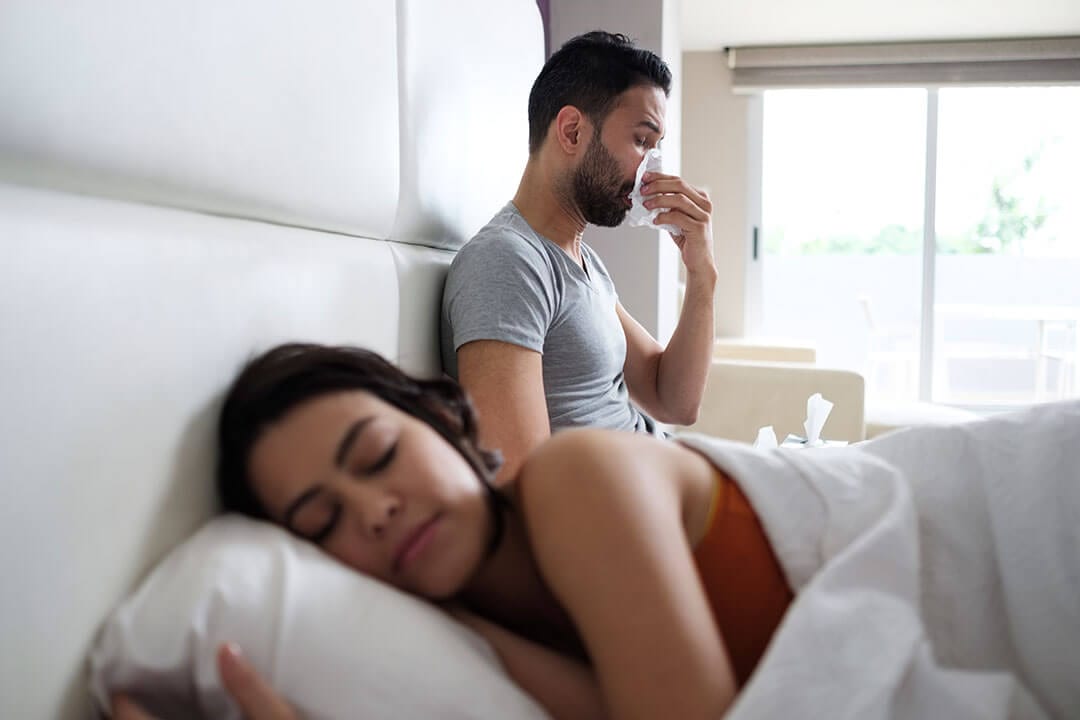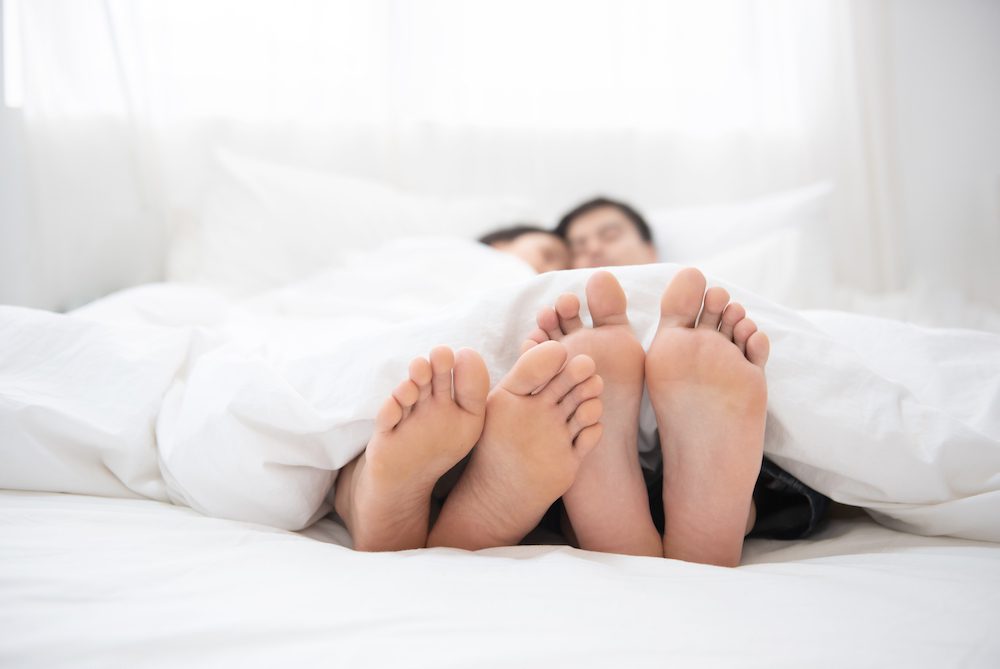Medical Disclaimer: The following content should not be used as medical advice or as a recommendation for any specific supplement or medication. It is important to consult your health care provider prior to starting a new medication or altering your current treatment.
Over 3 million people in the United States have epilepsy, a condition that involves repeated seizures over time. While epilepsy is complex, evidence suggests that sleep deprivation may trigger seizures, and people with epilepsy often have sleep disorders. At the same time, seizures can occur during sleep and may interfere with the normal functions of sleep.
If you have epilepsy, it may be helpful to learn about how seizures and sleep are related as well as the steps that may help improve sleep and potentially reduce symptoms of epilepsy.
Understanding Epilepsy and Sleep
Epilepsy and sleep may be closely linked. Some experts believe there is a bidirectional relationship in which sleep can affect epilepsy while epilepsy can also affect sleep.
Seizures occur because of disruptions in normal brain activity. Billions of neurons in the brain and nervous system are constantly sending electrical signals to help people think, perceive, and move. When these signals are abnormal on one or both sides of the brain, it can trigger a seizure, which can involve convulsions, twitching, loss of awareness, or stiffening of muscles.
Epilepsy is a condition in which a person has multiple seizures over time or may be likely to have recurrent seizures. There are dozens of types of seizures and over a hundred kinds of epilepsies. Seizures and epilepsies are often classified based on the parts of the brain that are affected.
Focal epilepsies affect one brain region while generalized epilepsies affect both sides of the brain. Many people have seizures or an epileptic event that starts in one region of the brain but generalizes to the rest of the brain within seconds.
In some people with epilepsy, not getting enough sleep can increase the frequency of seizures. Studies have also found a correlation between several sleep disorders and epilepsy. In addition, changing patterns of brain activity during sleep affects the risk of seizures, which are more common during non-rapid eye movement (NREM) sleep.
Epilepsy may also have an effect on sleep. People who experience nocturnal seizures may get woken up during the night or have other symptoms that interrupt sleep. For some people, sleep-related seizures may negatively impact their overall sleep quality.
Epilepsy and Sleep Disorders
Many people with epilepsy also have sleep disorders that affect the quality or quantity of their sleep. Experts believe that several types of sleep disorders may have a relationship with epilepsy.
- Insomnia: Insomnia is a sleep disorder involving difficulty falling asleep or maintaining sleep that affects how a person functions during waking hours. While the exact reason is not clear, people with epilepsy frequently have worse seizures if they also have insomnia.
- Obstructive sleep apnea: Obstructive sleep apnea (OSA) is a condition where the airway collapses during sleep, causing ongoing interruptions in breathing throughout the night. Breathing interruptions can lead to disrupted sleep and low oxygen levels. OSA has been linked to worsened seizure symptoms in people with epilepsy.
- Parasomnias: Parasomnias are unusual behaviors during sleep, such as sleepwalking. Parasomnias may be mistaken for epilepsy since some nocturnal seizures can cause similar symptoms. Some researchers have theorized that epilepsy and parasomnias are connected, but more research is required in order to prove any direct link.
Epilepsy and Sleep Deprivation
In some cases, reduced sleep quantity may play a role in triggering seizures. Several studies found that sleep deprivation may worsen epilepsy. It is difficult to know from those studies whether seizures were provoked by sleep loss itself or by an underlying issue like stress or medication use.
Future research may offer greater insights into the impact of insufficient sleep on epilepsy.
Types of Sleep-Related Epileptic Seizures
Some kinds of seizures can happen during any time of day, but sleep-related seizures happen mostly or exclusively during sleep or shortly after a person wakes up.
It is believed that sleep-related seizures make up around 15% of cases of epilepsy. These include several distinct types of epilepsy that can occur in children or adults.
- Sleep-related hypermotor epilepsy: Sleep-related hypermotor epilepsy (SHE) consists of seizures that occur in the frontal regions of the brain. Seizures linked to this condition occur mostly during sleep and can include short bouts of sudden muscle tightening or weakness. The condition most often arises during or shortly before adolescence.
- Nocturnal temporal lobe epilepsy: Nocturnal temporal lobe epilepsy (NTLE) typically begins during adolescence with seizures only occurring during evening sleep. A NTLE-related seizure usually causes someone to suddenly wake up from sleep with involuntary movements and behavior and limited awareness of their actions or environment.
- Nocturnal parietal or occipital lobe epilepsy: These types of epilepsy usually start during teenage years or in early adulthood. Seizures arise during sleep and cause short episodes with symptoms like the loss of muscle control.
- Benign epilepsy with centrotemporal spikes: Benign epilepsy with centrotemporal spikes (BECTS) typically begins in childhood. Seizures generally only occur during sleep. The seizures are usually harmless but may cause twitching in the face and drooling.
- Benign epilepsy with occipital spikes: Benign epilepsy with occipital spikes is similar to BECTS. Seizures are normally not harmful, occur mostly during sleep, and begin in early childhood.
- Lennox-Gastaut syndrome: Children with this syndrome have seizures that are more likely to occur during sleep although seizures may also happen at other times of the day. The condition can provoke a range of seizure types with different symptoms.
- Landau-Kleffner syndrome: This syndrome normally affects children and is marked by abnormal brain activity that begins while falling asleep. This brain activity can provoke seizures, and the condition may affect hearing and speech.
- Juvenile myoclonic epilepsy: Juvenile myoclonic epilepsy (JME) is a genetic syndrome that can cause multiple types of seizures that normally begin during adolescence. These seizures occur shortly after awakening from sleep.
Signs of Epileptic Seizures During Sleep
Because there are multiple types of sleep-related seizures, there are also a range of symptoms that can occur in a person having a nocturnal seizure. The signs of an epileptic seizure during waking hours or sleep can vary based on the parts of the brain that are affected.
Examples of the type of symptoms that can occur during seizures include:
- Tightening of muscles
- Relaxation of muscles or loss of muscle control
- Twitches, jerks, or spasms affecting one or more parts of the body
- Abnormal motor movements, including getting out of bed
- Confusion or unresponsiveness
- Strange sensations including changes to vision or smell
- Expressions of terror or fear
- Audible vocalizations
Sometimes, a seizure may cause a person to wake up from sleep. In other cases, they may appear to be awake but not actually have awareness of their surroundings or behavior. Seizures usually do not last longer than two minutes, and sometimes they may last only a few seconds.
For someone with a history of seizures, it’s generally a medical emergency if a seizure lasts more than five minutes or the person does not wake up between repeated seizures. For people who have never had a seizure before, a seizure of any length is a medical emergency.
Caregivers or family members who notice seizure activity in a person who has never had a seizure should contact emergency health personnel. Likewise, they should contact emergency services if someone with epilepsy has a seizure over five minutes or is unresponsive between seizures.
Signs of Epilepsy in Children
Epilepsy may affect children differently than adults because children’s brains are still developing. Seizure symptoms can vary depending on a child’s age with symptoms in children over 6 years old often appearing similar to symptoms in adults.
In particular, infants and babies can have seizure symptoms that are more subtle and may at times be harder to recognize, especially because it can be hard to judge a baby’s level of awareness. Potential signs of seizures in children under 2 years old may include:
- Head nods or larger loss of muscle control
- Sudden behavior change that may occur alongside pale or bluish skin
- Jerks of eyelids or other muscles
- Clusters of spasms with flailing arms or legs
- Periods of staring into space
Similar to adults, children with epilepsy frequently have sleeping problems even if they do not have a sleep-related type of epilepsy. In some cases, sleeping difficulties may be linked to certain antiseizure medications that have the potential to interfere with the sleep-wake cycle.
Caregivers of children with epilepsy or symptoms of epilepsy should talk with a pediatrician to determine the most appropriate plan for their overall care.
How Epilepsy Is Diagnosed
Having a seizure does not always mean that a person has epilepsy. However, people who have a first seizure should see a doctor who can review their health history and conduct any necessary exams to determine whether they may have epilepsy or be at risk of future seizures.
A type of test called electroencephalography (EEG) is a common tool that is used to detect epilepsy. An EEG uses electrodes on the scalp to measure brain activity. These measurements can show whether there is any pattern of electrical activity that indicates that a seizure has happened.
People may need to use an EEG device throughout the day for several weeks. Since some people may only experience seizures during sleep, a sleep EEG may be needed and is often conducted during an overnight sleep study in a specialized lab.
Tests like a CT scan or an MRI may also be used to obtain images of the brain in order to try to identify the source of any abnormal electrical activity in the brain.
A doctor will consider a person’s symptoms, health history, and test results when diagnosing a person with epilepsy and determining the type of epilepsy that they have.
Living With Epilepsy
While you should speak with your health care provider about specific treatments for epilepsy, there are a number of habits that may help decrease the likelihood of having seizures. These habits include:
- Getting enough sleep at night
- Eating a healthy diet and exercising every day
- Limiting use of alcohol and avoiding tobacco and recreational drugs
- Doing mental activities to keep your memory sharp
- Finding techniques to reduce stress and improve emotional health
- Taking medications as prescribed by your health care provider
It can help to keep a daily log that tracks any time you have seizures along with notes about your daily activities, including information about your sleep. This practice may help you identify seizure triggers.
Medications for Epilepsy
A health care provider may prescribe a type of medication called an anticonvulsant to help manage seizures. There are many different types of anticonvulsants, but they generally work by modifying the electrical activity in the brain and nervous system.
Anticonvulsants may not work for everyone, and they can have side effects. For example, sometimes anticonvulsants disrupt sleep, which may have the potential to counteract some of their effect on reducing seizures.
A health care provider can help weigh the benefits and side effects of taking anticonvulsants and determine whether or not medications are the right approach of treatment for any specific individual.
Tips to Improve Your Sleep
Since sleep may affect epilepsy, understanding how to improve your sleep hygiene can contribute to your routines to try to prevent or reduce seizures.
Some tips to improve your sleep habits include:
- Following a consistent sleep schedule every day
- Avoiding caffeine and large meals too close to bedtime
- Stopping using electronics, including mobile phones, for around an hour before bed
- Ensuring your sleep environment is dark and quiet
- Avoiding use of your bed for any activity other than sleep and sex
- Creating a relaxing bedtime routine
Your doctor can also provide tailored advice about improving your sleep. If you have ongoing or worsening sleeping problems, your doctor can help determine whether a sleep study or other testing is warranted. Your doctor can make sure that your sleep habits and your treatment for epilepsy are working in conjunction to improve your overall health.
References
Ask the Sleep Doctor
Have questions about sleep? Submit them here! We use your questions to help us decide topics for future articles, videos, and newsletters. We try to answer as many questions as possible. You can also send us an email. Please note, we cannot provide specific medical advice, and always recommend you contact your doctor for any medical matters.









